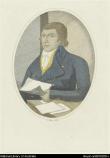George Mealmaker, the son of a Dundee weaver, was a radical political activist transported to New South Wales as a convict. Following his father into the hand-loom weaving trade, Mealmaker became relatively prosperous, and was also well educated. From 1791, he was leading member of the Dundee group the "Friends of Liberty," which were sympathetic to the ideals of the French Revolution. Mealmaker's 1793 broadsheet, "An Address to the People," resulted in the transportation of Thomas Fyshe Palmer, who had arranged its publication. Mealmaker later joined the United Scotsmen, a radical group formed in imitation of the United Irishmen. His 1797 tract The Moral and Political Catechism of Man again drew the attention of the British government, and this time Mealmaker himself was tried for sedition and sentenced to fourteen years transportation.
Arriving in Sydney in 1800, Mealmaker was implicated in a rumoured convict rebellion but denied any involvement. As Michael Roe points out, Mealmaker's trade, rather than his political views, shaped his life in the colony. In August 1803, governor Phillip Gidley King appointed him to establish a weaving workshop at the first Female Factory in Parramatta; King was highly complimentary about Mealmaker's industry there. King's replacement as governor, William Bligh, did not encourage Mealmaker's endeavours, however. He died destitute and alcoholic in 1808.
See related entry.
 1089519868172553972.jpg
1089519868172553972.jpg
 1089519868172553972.jpg
1089519868172553972.jpg